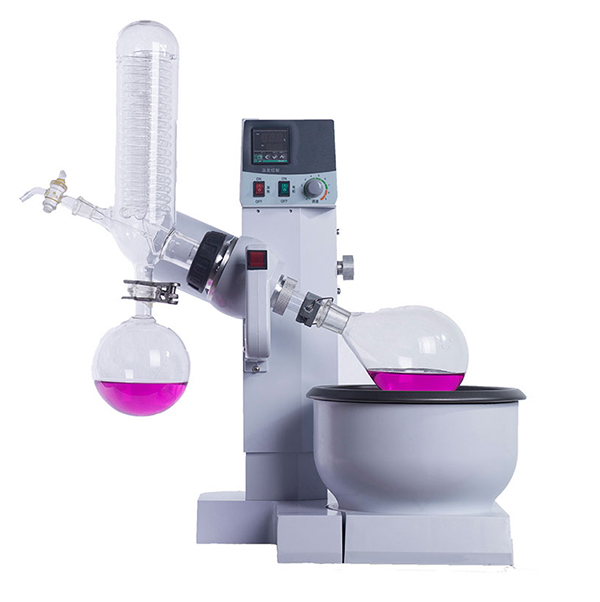what is the purpose of a rotary evaporator
A rotary evaporator (rotavap) is a device used in chemical laboratories for the efficient and gentle removal of solvents from samples by evaporation.The basic theory is that the apparatus works by vacuum distillation. Rotating the "pot" provides agitation, maintains contact with a warming bath (hot water, usually), and maximizes the surface area of the liquid you are evaporating. However, the cost of doing this is that the seal is a likely spot for air leaks to occur. Cooling the collecting flask minimizes the amount of solvent vapor that gets into the water stream from the aspirator; in many cases use of a dry ice trap is needed to avoid contaminating wastewater with organic solvents.

The purpose of rotary evaporator distillation is to separate a given mixture into its components based on their respective volatilities, through the process of evaporation and condensation (liquid-gas-liquid).
We use the rotary evaporator for two main purposes:
1) to concentrate non-volatile components in a mixture (for example, concentrating the purest and freshest flavors from a blood orange by removing the water).
2) to extract the volatile aroma and flavor molecules from mixtures gently and at low temperatures (for example, extracting the desired flavors from a blend of alcohol, herbs, and fruit without heating the mixture up).
The key to understanding any distillation is to remember that it is a separation. Sugars, acids, colors, and most bitter compounds are separated from aromas, alcohols, water, and small flavor molecules, etc. What is phenomenal about rotary evaporator distillation, as opposed to standard distillation, is that it can separate food compounds from one another without altering them.
Two key components of the rotary evaporator allow for a gentle, precise, and efficient distillation not found in conventional distilling apparatuses:
1) the solvent is removed under vacuum, which lowers its boiling point, eliminating the need for high-temperature distillation.
2) the rotation of the evaporating flask, immersed in a heated water bath, increases the surface area of the product, greatly speeding distillation and also, through forced convection, keeping the mixture evenly mixed and heated to promote stable, even evaporation.
An additional benefit of laboratory-type stills is that laboratory condensers, being sealed and made of glass, are easy to visually monitor and adjust. We can, therefore, recover almost 100% of the solvent.
- High-tech Zone, Zhengzhou City, Henan Province, China.
- +86 132 9817 7608
- info@rotovap-wellknown.com
- li249869402
Copyright © Zhengzhou Well-known Instrument & Equipment Co.,Ltd. All Rights Reserved Sitemap










